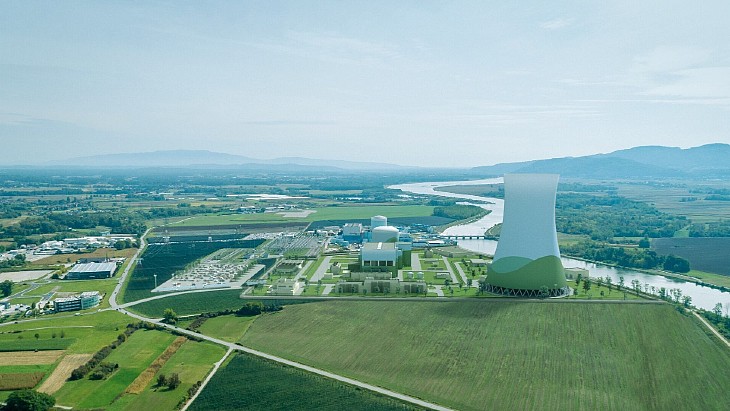GEN energija has given its latest update on the development of plans for the JEK2 new nuclear capacity in Slovenia, putting forward likely costs and saying that from the point of view of the power network 1300 MW would be the optimal size.

How JEK2 could look (Image: GEN energija)
GEN energija said that its "best internal assessment" - and not based on binding offers from potential suppliers - was overnight construction costs of EUR9300 per kW of installed power: "This means EUR9.3 billion (USD10.1 billion) for a power plant of 1000 MW and EUR15.4 billion for a power plant of 1650 MW. For all calculations and used assumptions, we intend to obtain an international review by a recognised institution before the referendum is held."
In a report of the briefing, GEN energija said its study of the country's power system considered options from 1000 MWe to 2400 MWe - "the key findings are that from the point of view of safety and stability" of the country's power network "the optimal size of JEK2 is up to 1300 MW of net electric power ... and that new sources of balancing system services are needed, especially resources to ensure the manual reserve for frequency recovery".
GEN Energija says the project is of "exceptional strategic importance" enabling decarbonisation and energy security for 80 years or more. It also estimates there will be an estimated 5640 new jobs in 10 years as well as more than 37% share of domestic suppliers for the project.
Slovenia's plan is to build the new nuclear power plant, with up to 2400 MW capacity, next to its existing nuclear power plant, Krško, a 696 MWe pressurised water reactor which generates about one-third of the country's electricity and which is co-owned by neighbouring Croatia. Prime Minister Robert Golob has committed to holding a referendum on the project before it goes ahead, and has suggested it could be held later in 2024.
The current timetable for the project is for a final investment decision to be taken in 2028, with construction beginning in 2032. In October, GEN Energy CEO Dejan Paravan said there were three technology providers being considered for the project - Westinghouse, EDF and Korea Hydro & Nuclear Power - who all had strengths and "the decision will not be easy".
There was a further boost for the project on Thursday when Slovenia's National Assembly passed a resolution on the long-term peaceful use of nuclear energy, including the JEK2 project and the proposal for a referendum.